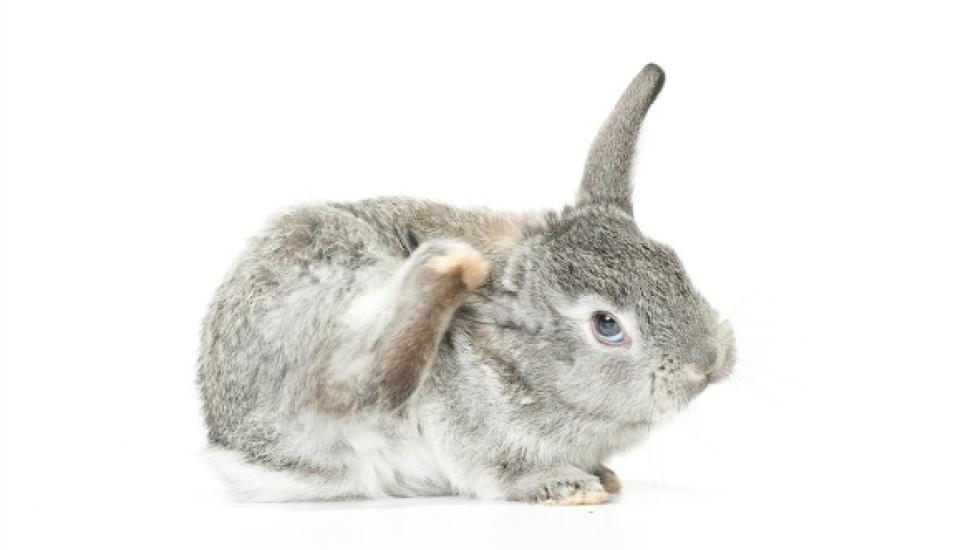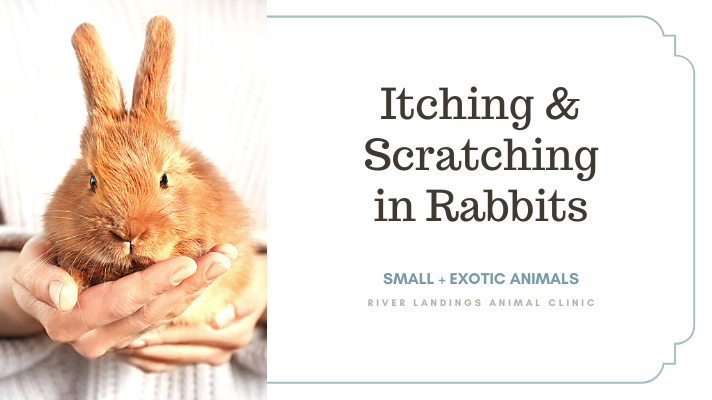A rabbit that is itchy and scratching may be experiencing allergies, in which case antihistamines may be prescribed. Otherwise, local application of sprays, ointments, or gels, including zinc oxide plus menthol powder, may be recommended.
During treatment, it is important to keep the affected area clean and dry. Excessive scratching, overgrooming, dandruff, or fur loss may indicate a parasite infestation, with mites and fleas being the most common culprits in rabbits. Checking for signs such as flaky skin, bald patches, red and sore skin, black flecks in the fur, excessive scratching, or ear shaking can help identify if your rabbit has mites.
Although Cheyletiella mites can affect rabbits, dogs, and cats, causing mild to severe illness in humans, diagnosis can be challenging as their life cycle does not occur in humans. Dry skin in rabbits can also lead to itching and scratching, which may result from low humidity, dusty environments, poor diets, frequent bathing, or the use of inappropriate shampoos.

Credit: www.petmd.com
Causes Of Itching And Scratching
Excessive scratching in rabbits can be a result of various causes, including allergies or parasite infestations like mites and fleas. Treatment options range from antihistamines for allergies to local sprays or ointments for affected areas. It is important to keep the affected area clean and dry during treatment.
Parasites
Rabbits are susceptible to various parasites that can cause itching and scratching. The most common parasites affecting rabbits include mites and fleas. These pests can infest your rabbit’s fur, leading to excessive scratching and overgrooming. It is important to check your rabbit regularly for signs of mites, such as flaky skin, bald patches, and black flecks in the fur. If you notice these symptoms, consult your veterinarian for appropriate treatment options.Dry Skin
Dry skin is another common cause of itching and scratching in rabbits. Factors that can contribute to dry skin include low humidity in the environment, dusty surroundings, poor diet, and improper bathing practices. In order to prevent dry skin, it is important to maintain proper humidity levels in your rabbit’s living area, provide a balanced and nutritious diet, and avoid excessive bathing. If your rabbit experiences dry skin, it may require special moisturizing products or adjustments to its environment.Skin Infections
Skin infections can also lead to itching and scratching in rabbits. These infections may be caused by bacteria, fungi, or other pathogens. Common signs of skin infections include redness, soreness, and abnormal discharge. If your rabbit exhibits these symptoms, it is crucial to seek veterinary care. Treatment options may include topical applications, oral medications, or other interventions depending on the severity of the infection. In conclusion, itching and scratching in rabbits can be caused by various factors, including parasite infestation, dry skin, and skin infections. It is important to closely monitor your rabbit’s behavior and physical appearance to identify any signs of discomfort. If you suspect any underlying issues, consult with a veterinarian to determine the appropriate treatment plan for your furry friend.:strip_icc()/TysonGatesEyeEm-5c423cbb46e0fb00018eb434.jpg)
Credit: www.thesprucepets.com
Symptoms Of Itching And Scratching
Signs of itching and scratching in rabbits may indicate a potential parasite infestation, such as mites or fleas. Monitoring your rabbit daily for flaky skin, bald patches, excessive scratching, or ear shaking can help identify skin problems. Keeping the affected area clean and dry during treatment is essential to alleviate discomfort.
Rabbits can be prone to itching and scratching, which can indicate underlying health issues or discomfort. It is important for rabbit owners to be aware of the symptoms associated with itching and scratching, as they can help identify and address potential problems early on. Some of the common symptoms of itching and scratching in rabbits include:
Excessive Scratching
Excessive scratching is one of the most noticeable signs of itching in rabbits. If you observe your rabbit scratching more than usual, it may indicate the presence of parasites such as fleas or mites. Rabbits may scratch vigorously with their hind legs or use their front paws to scratch their ears, face, or body. It is important to pay attention to excessive scratching and take appropriate action to provide relief for your rabbit.
Overgrooming
In addition to excessive scratching, rabbits may engage in overgrooming behavior as a response to itching. Overgrooming is when rabbits constantly lick or chew on their fur, leading to bald patches or fur loss. This behavior is often a coping mechanism for rabbits and can worsen the itching and skin irritation. If you notice your rabbit overgrooming, it is essential to address the underlying cause and provide suitable treatment to alleviate their discomfort.
Fur Loss
Fur loss is another symptom commonly associated with itching and scratching in rabbits. Excessive scratching and overgrooming can lead to patches of fur becoming thin or completely absent. The fur loss may be localized to specific areas where the rabbit is focusing their scratching or grooming, or it can be more widespread. Regularly check your rabbit’s fur for any signs of hair loss, as this can indicate an issue that requires prompt attention and treatment.
If you notice any of these symptoms in your rabbit, it is important to seek veterinary care to determine the underlying cause of their itching and scratching. Your veterinarian can perform a thorough examination and recommend appropriate treatments, such as anti-parasitic medications or changes to your rabbit’s diet or environment, to help alleviate their discomfort and restore their overall health and well-being.
Treatment And Prevention
Itching and scratching in rabbits can be uncomfortable for both the rabbit and its owner. It is important to address this issue promptly to provide relief to your furry friend. In this section, we will explore different treatment options and preventive measures to manage itching and scratching in rabbits.
Medication
If allergies are suspected to be the cause of itching, your veterinarian may prescribe antihistamines to alleviate the symptoms. However, in some cases, local application sprays, ointments, or gels may be recommended. Zinc oxide plus menthol powder can also be prescribed for certain conditions. It is crucial to diligently follow the prescribed medication instructions for the best results.
Proper Hygiene
During the treatment, it is essential to keep the affected area clean and dry. Regularly check your rabbit’s skin for signs of mites, flaky skin, bald patches, redness, and excessive scratching. Use appropriate grooming tools to remove loose fur and keep the coat well-maintained. Consult your veterinarian for suitable grooming techniques and products to prevent further irritation.
Environmental Factors
Environmental factors can contribute to itching and scratching in rabbits. Ensure that your rabbit’s living space is free from dusty environments and allergens. Regularly clean the cage and bedding to maintain cleanliness. Provide appropriate ventilation and maintain optimal humidity levels in the room. Additionally, review your rabbit’s diet as poor nutrition can contribute to dry skin and itching. Consult your veterinarian for a balanced diet recommendation.
By combining proper medication, hygiene, and addressing environmental factors, you can effectively manage and prevent itching and scratching in rabbits. If you notice persistent symptoms or if your rabbit’s condition worsens, consult your veterinarian for further guidance and treatment options.

Credit: www.riverlandingsanimalclinic.com
Frequently Asked Questions On Itching And Scratching In Rabbits
How Do You Treat A Rabbit That Is Itchy?
To treat a rabbit that is itchy, consult a veterinarian to determine the cause. If allergies are suspected, antihistamines may be prescribed. For local application, sprays, ointments, or gels can be used. It’s important to keep the affected area clean and dry during treatment.
Regularly check your rabbit for signs of mites or fleas, such as excessive scratching or flaky skin.
Why Is My Bunny Scratching So Much?
Excessive scratching in bunnies may be due to a parasite infestation like mites or fleas. Other signs include overgrooming, dandruff, or fur loss. It’s important to check your rabbit daily for these signs. Keep the affected area clean and dry.
How Do I Know If My Rabbit Has Mites?
To determine if your rabbit has mites, check for signs such as flaky skin, bald patches, red and sore skin, black flecks in the fur, excessive scratching, or ear shaking. These indicate a potential skin problem or infestation. Regularly inspect your rabbit’s fur and skin for these symptoms.
Can Humans Get Rabbit Mites?
Yes, humans can get rabbit mites. These nonburrowing mites can cause mild to severe illness in humans, but diagnosis can be challenging as they don’t complete their life cycle in humans.
Conclusion
It is important to monitor your rabbit’s behavior and take note of any excessive itching or scratching. These symptoms may indicate a parasitic infestation such as mites or fleas. Consulting a veterinarian is crucial to determine the underlying cause and prescribe appropriate treatment.
Additionally, maintaining a clean and dry environment for your rabbit can help alleviate discomfort and prevent further skin problems.

